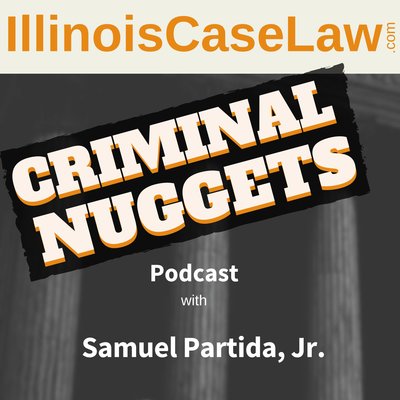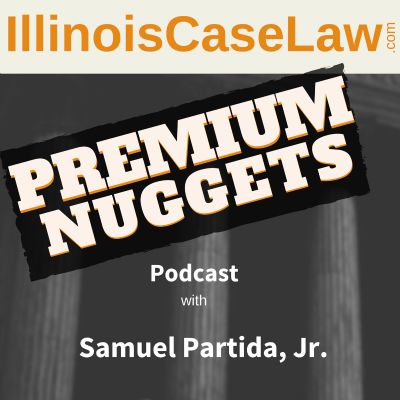Feb 18, 2020
In Episode 738 (Duration 35:06) Illinois attorney Daniel Epstein sat down with the Criminal Nuggets Podcast and told us about his vision for the Illinois Supreme Court.
In This Episode…
“These rules people don’t think about very much actually have a real impact on our substantive rights and whether we find truth in our courts.” — Daniel A. Epstein
How can the Illinois Supreme Court use its supervisory power to improve our criminal justice system?
Daniel has some big ideas that could make a big difference. For starters we can:
- Rewrite some of the rules of evidence
- Create broader criminal discovery (Go to 24:54)
- Allow some form of a criminal deposition (Go to 13:51)
- Listen to the entire episode to hear all of Daniel Epstein’s ideas.
Who Is Daniel Epstein?
Daniel Epstein is a candidate for justice of the Illinois Supreme Court. He’s running to be elected to the state’s highest court.
Before entering the race he was an attorney with Jenner & Block in Chicago and he worked on the following types of cases:
- Appeals
- Civil Rights
- Post Conviction Litigation
- Immigration
- Domestic Violence Orders of Protection
- Criminal Defense
- Complex Commercial Civil Litigation
- Intellectual Property
- Government Contracts
- Internal Investigations
Campaign Information
Evanston, IL
info@epsteinforsupremecourt.com
https://www.epsteinforsupremecourt.com/
“Can’t Miss” Moments:
✓ “The most important way that I’m different is that I’m talking about reform, and in particular, use of the court’s non adjudicative power.” – Daniel A. Epstein
✓ Did you know more than one third of the justices on the Supreme Court of the United States and the Illinois Supreme Court went from being attorneys straight to the supreme court without any prior judicial experience? (Go to 2:11)
✓ The Illinois Supreme Court is unique because it is not just a case decider it is also a policy maker. It writes the rules. (Go to 2:58)
✓ “No one on the Supreme Court is a biometrician. They don’t do biometrics they review biometrics.” (Go to 4:15)
✓ The thing that got Daniel Epstein into the race was a case. It was an attempt murder case and it illuminated one glaring problem in our criminal justice system. (Go to 5:25)
✓ In this episode you’ll discover an answer to one of biggest puzzles affecting Illinois criminal justice reform: How does a guy like Jon Burge get away with doing what he did for 20 year? In other words, why didn’t the system uproot and reveal his malfeasance much sooner? (Go to 7:26)
✓ Are you comfortable with the fact that our forensic labs and our court system “earns” more money for every conviction it produces? See the Criminal And Traffic Assessment Act and the Statute on Fines, Fees,& Assessments. (Go to 8:34)
✓ “In order to keep the system alive there needs to be a flow of money. In some cases our courts have really contorted themselves in order to carry water for a legislature that has been unwilling to fund or system at a level that justice requires.” (Go to 12:15)
✓ Bond is about public safety and ensuring people come back to court. Bond is not about this one thing that Daniel finds outrageous. (Go to 12:30)
✓ It’s a well known secret that some Cook County prosecutors do this as a form of trial prep? It might be “legal” but also not what the rules intended. (Go to 18:14)
✓ We actually use to believe trial by ambush was the best system. We don’t believe that anymore. There is a better way. There’s nothing wrong from learning from our mistakes and reforming. (Go to 21:04)
✓ Why prosecutors may support and benefit from some of Daniel Epstein’s criminal justice reform ideas. (Go to 22:21)
✓ “An ounce of prevention is worth a pound of cure.” How true this is when applied to our criminal justice system. (Go to 23:49)
✓ What you need to know about the “Open File Rule.” Other states do it, it reduces the work load for prosecutors and it could make a big difference for us in Illinois. (Go to 24:54)
✓ Listen to what Daniel Epstein has to say about wrongful convictions. I asked if if it’s a large problem, a small problem or no problem at at? (Go to 28:26)
Links & Resources
- The Six Flags Biometrics Case
- Illinois Supreme Court Rule 402
- Jon Burge Notorious Chicago Detective Who Tortured Suspects
- Public Act 100-0987 The Criminal And Traffic Assessment Act
- Understanding Illinois’ New Court Fines And Fees Law
- Illinois Rule Of Evidence 414 On Criminal Depositions
- Illinois Rule Of Evidence 702 On Expert Witnesses



